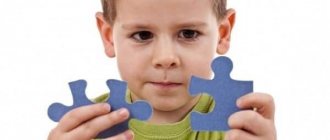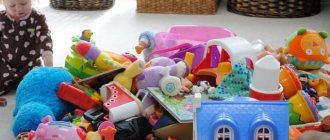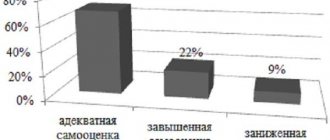A schoolchild’s self-esteem is the child’s attitude towards himself, his abilities, subjective capabilities, character traits, personal qualities, and actions. All life achievements, interpersonal interactions, and academic success depend on its adequacy.
A student’s self-esteem develops from infancy and subsequently has a significant impact on the individual’s adult life, his behavior, attitude towards events and towards himself and the surrounding society. The primary task of adults, along with caring, raising, and educating the child, is to develop adequate self-esteem and self-esteem.
What is a child's self-esteem
A child’s self-esteem is the preschooler’s perception of his qualities, his character and personality. It reflects his opinion of himself as a person. In early childhood, a child evaluates primarily his physical capabilities and appearance. As he gets older, he pays attention to his practical skills and begins to realize the value of moral qualities.
Self-awareness and self-esteem in preschool age begin to have a powerful influence on all the child’s actions, on his relationships with teachers, parents or other children.
A child’s self-esteem is greatly influenced by the attitude of those around him, that is, the opinion of children and adults regarding his actions, ability to do certain things, express his emotions, and obey specific norms of behavior.
The child must master the skill of relating and coordinating his own desires and intentions with the plans and capabilities of other people, finding a common language with them, and anticipating their assessment of his actions, motives and manifestations of emotions. To characterize the self-esteem of preschool children, the key is the influence of the activity that becomes the main one for them. Such leading activities are directly related to the success that the child can show in school. It is necessary to teach a child to control his behavior, since without self-control a healthy and adequate assessment of his personality is impossible. At every stage of their work, children must maintain attention, accuracy and patience. The development of these qualities immediately produces positive results, which, in turn, become the key to a strong positive child’s self-esteem.
How to increase self-esteem
Self-esteem is much easier to correct in childhood. Parents and teachers are the first helpers in this difficult task. It is difficult for a child to adequately evaluate himself; adults must come to his aid. Help your child find something he likes, be proud of him and encourage his small victories. It is important for a child to know and feel that he is loved and respected. Teach your child to defend his point of view and make it clear that it is impossible to please everyone. Explain that no one will encourage the victim's condition and that it is worth thinking about yourself, of course, not to the detriment of others. Help your child learn to justify their decisions.
How is the self-esteem of younger schoolchildren formed?
Great attention should be paid to the development of self-esteem in primary school age. Appropriate activities should take place regularly in the classroom. Children who have not yet reached the age of 7 years are not able to consciously form an assessment of personality. They think in images. Preschool children develop only a conscious interest in self-esteem.
The development of self-esteem in preschool age occurs gradually and has its own special features. When children first enter the school environment, they tend to divide their classmates into groups. Mentally they call some good and others bad, some weak and others strong. Hierarchy in a children's team can form unusually quickly. After only 3-4 months in the classroom in the first year of study, all roles are fairly clearly distributed. However, over time, school success and achievements change social roles and hierarchical connections in the children's team. The child’s self-esteem begins to be strongly influenced by teachers’ comments and grades for completed assignments. The student constantly compares himself with other children. When peers or older generations strive to support such comparison, the child begins to perceive it as the main tool of self-esteem, whatever that may be.
How a child perceives his first grades is of great importance. Younger schoolchildren, who often have unstable self-esteem and low self-esteem, do not easily come to terms with low scores received for homework or answers at the board. Internally, they do not agree with this assessment of their activities and often create conflict situations. However, conflicts only make the situation worse. Emotional tension increases, excitement intensifies, and the child becomes confused.
Gradually, children begin to perceive grades as labels and transfer grades for this or that activity to the individual. For example, a student who receives a C on several tests begins to seem to his classmates as not a very good person, whose character and abilities can also only be assessed as 3 points. This is how children develop the habit of sticking labels and transferring teachers’ evaluative statements onto the personality of their peers as a whole.
The formation of correct self-esteem is rarely done purposefully, giving the child the opportunity to independently form an opinion about himself. However, few children can correctly assess their character and actions, so in most cases children need the delicate and unobtrusive help of wise adults.
Features of self-esteem of younger schoolchildren
Psychologists have conducted in-depth diagnostic studies among a large number of junior schoolchildren. They were able to find out that children of this age have different types of self-esteem: adequate, overestimated and underestimated. Each of these types of self-esteem can be stable or flexible. All children can be divided into several groups, according to the types of self-esteem they have:
- Children of primary school age with adequate self-esteem usually look energetic and active. They can be called resourceful and diligent. They learn with pleasure, are not averse to criticism, they are open to communication and have a sense of humor. They find new tasks attractive and interesting. They do not have to make significant efforts to maintain friendship.
- Children whose self-esteem is consistently high put a lot of effort into succeeding in activities of any kind. They like to be completely independent in their decisions and choice of friends. They don't respect social rules. If a child has high self-esteem, he is usually self-confident and believes that he can achieve great success both academically and in interpersonal relationships without the help and support of others.
- Younger schoolchildren, whose self-esteem is inflated, but at the same time unstable, tend to evaluate themselves too highly, exaggerate their capabilities, overestimate personal qualities and the results of their work. They try to take on tasks that they are clearly unable to complete. When they fail (and this is most often the case), they either change activities abruptly or stubbornly continue to insist that they can do the job. They form numerous social connections, but almost always fragile ones.
- If a child has low self-esteem, he will prefer the easiest tasks and assignments, because he has a better chance of completing them. The process of studying causes him anxiety and excitement. Such a child has no achievements on the basis of which he can evaluate himself more highly, but he strives not to lose at least the self-esteem that he has. Increasing self-esteem in such circumstances becomes extremely necessary, because, having a bad opinion of himself, the child does not understand how to communicate correctly, what to do in class and how to build relationships with adults. He subconsciously expects trouble from everyone around him. He develops a negative internal position.
How to build adequate self-esteem
First of all, I would like to note that adequate self-esteem is an important indicator in the formation of an individual’s mental health. Such a person is able to perceive reality as it is and, without trying to change the world, easily adapts to life. The success and comfortable existence of an individual in society depends on adequate self-esteem. If you are determined to raise a healthy and happy child, and this is what all parents dream of, think about your behavior.
There comes a period when girls copy their mothers, and boys copy their fathers. Much depends on the attitude of parents towards each other. And remember that children have very developed intuition. Don't try to deceive them with an external picture. If mom or dad are not confident in themselves, cannot defend their opinion and constantly complain about life, you should not think that the baby does not notice this. Below we describe in more detail several effective techniques for developing adequate children's self-esteem. Check yourself to see if everything is fine in your family.
Check whether excessive conditions have been created
Let's say you start to notice that your child is overly criticizing himself. Expressions began to appear in his vocabulary: “I can’t do anything,” “I’ll never succeed,” “I’ll never be able to.” Let's figure it out. The key point here is: “they began to notice.” That is, before the child was cheerful, showed interest in knowledge, and suddenly it doesn’t work out and he doesn’t want anything.
Let's look at an example. Two girls studied in 5-A: Masha and Katya. Both were diligent students, were very friendly, and their parents also communicated well with each other. At one of the family holidays, Katya’s mother said that her daughter has an incredible talent for drawing and she is very happy about it. “Drawing is wonderful, not like some dangerous sport,” the woman said.
For some reason, Masha’s mother immediately decided that the children should definitely go to classes together, without finding out whether her daughter had this talent. “All children love to draw,” she thought. Less than two months had passed when the teacher noted Katya and began recommending her works for all kinds of children's competitions, and the Machines' works were mediocre children's drawings. The girl lost faith in her own abilities, began to study worse due to lack of self-confidence, and did not even want to be friends with her friend, who turned out to be more successful than her.
Everything could have turned out differently if Masha’s mother had not created inflated conditions for her.
Do not force anything on your children, rather help them decide on their desires, and if the child does not have any special talents, praise him for good grades, because this is his work. Just don’t compare him with others in his favor, this may have negative consequences in the future.
Peer opinion
Indeed, the opinion of peers is very important. First, understand the situation: if someone said something bad about your son or daughter, this is not a reason to run to school to restore justice. The child's psyche is a fragile thing and breaks very quickly. The criteria for assessing children are very high and sometimes defy logic.
Children may mock only because a peer is slightly fatter or is a better student than others. If there is open bullying, it is better to transfer to another school. Most likely, absolutely normal and adequate relationships will develop in the new team. Give your teenager a chance to correct the situation on his own and feel important in the team. Have a conversation about what not to do. Remember, you should not criticize your child. You can evaluate actions, but not a person.
If the situation is not critical and the teenager asks for some non-standard items in his wardrobe, so as not to stand out from the crowd of his peers, ask him to justify his request. If he wants ripped jeans, and he made this decision on his own, then why not. Sometimes it is better to sacrifice your parental principles for the future benefit of the whole family.
Praise
Children and adults are very similar. Unless an adult has more responsibility. If the question arises about how to help increase children's self-esteem, listen to yourself. To help you? That's right, praise! You like it when management praises you, even if without a promotion and without an increase in wages, but how nice it is to hear praise for the good result of the work you have done.
So the baby is pleased when you praise him. Just praise for what you do, and not just like that. A developing personality must have a clear understanding of what is good and what is bad. This is how adequate self-esteem and assessment of reality as a whole are formed.
Overcome difficulties
Here again there is an intersection with adult life. For example, you have a catastrophic lack of time to go to the gym, but the desire to get your dream figure outweighs. After a hard day at work, you rush to the gym and after a few months the long-awaited result is noticeable. Would you be proud of yourself? Naturally, yes! Increased self-esteem is guaranteed.
So it is with a child’s self-esteem. Overcoming difficulties, the baby will learn to respect and love himself. You should not aim at global tasks. Start small. Let the baby do pull-ups on the horizontal bar with daddy's help 3-4 times. Achievement? Certainly! Don't forget to praise your son.
Girls, especially in adolescence, are not confident in their beauty and attractiveness. Uncertainty takes a huge toll on self-esteem. Take your daughter to a salon or a photo shoot. See how her mood changes. Transformation in appearance and self-acceptance is an important point in the formation of adequate self-esteem.
Functions of self-esteem of younger schoolchildren
Student self-esteem performs several functions:
- educational - when a child performs exercises and then evaluates their results, he repeats the educational material again;
- stimulating - uncompleted exercises encourage the student to put in more effort next time;
- motivational - fosters the desire to achieve one’s goals;
- analytical - encourages the use of structural thinking and organizing experience and knowledge.
Psychology considers all these functions to be key for the age-related development of children. Any activity - school, household or play - gives the child the opportunity to develop certain skills. Adequate self-esteem of a preschooler is based on the totality of their correct assessment.
Why is self-esteem needed?
Self-esteem helps you adequately assess your strengths and capabilities. The child can also evaluate actions and divide them into good and bad. If a child is motivated correctly, then self-esteem helps him gather strength and not give up at the first failure in completing a particular task. The role of self-esteem in a child’s life is very important.
The most common values for a child’s self-assessment include the following roles:
Self-assessment performs the following functions:
- motivates;
- develops the ability for self-analysis;
- teaches;
- stimulates.
It is thanks to adequate self-esteem that children are able to study well, engage in their favorite hobbies and build healthy relationships with peers.
Diagnosis of self-esteem of a junior schoolchild
Modern pedagogy can offer a variety of methods and exercises that allow you to find out the opinion of preschoolers about themselves. Special events that are designed to determine what a student’s self-esteem is should be held before lessons so that children’s thinking and emotions are not overloaded.
The method for determining self-esteem is usually complex, that is, it includes at least 3-4 different exercises:
- The teacher invites the child to depict himself, to draw. The student must describe the drawing and explain whether he likes the person he depicted. The teacher should ask which qualities of the drawn boy or girl are the best and which are the worst.
- An important part of the technique is to invite children to come up with new names for themselves. Children's imagination often exceeds all the expectations of adults, and the named names can provide a lot of information to psychologists.
- The test method is also popular: children are given questionnaire forms, and they give answers to the questions, which are then processed.
Diagnosis of self-esteem should be comprehensive. It is done in order to understand whether the self-esteem of preschoolers needs adjustment, and if so, what kind of adjustment. Adequate self-esteem is rare in a primary school student. It is important to remember that self-esteem at this age can change quickly, so diagnostic exercises should be carried out at least once a month.
Low self-esteem in a child
Very low self-esteem in a child is not very common. Each such child has a dramatic experience of difficult family circumstances. Most often these are seriously ill or alcoholic parents. Occasionally, low self-esteem is recorded in children whose parents adhere to an extremely authoritarian parenting style. Such fathers and mothers are ready to use physical punishment at any time. Therefore, the child grows up in fear and constant stress. Such children usually behave quite modestly, easily agree with peers and teachers, prefer to stay in the background, are reluctant to participate in general games and do not like to answer in front of the whole class. It is extremely difficult for them to achieve their goals, as well as to complete homework and be creative. Their self-realization suffers greatly, since they are always constrained, withdrawn and avoid communication.
Younger schoolchildren who have low self-esteem usually refuse tasks offered to them, because they are not confident in their strengths and abilities to cope with assignments. They have a very great fear of making a mistake, because at home they can be severely punished for any offense. Because of these behavioral characteristics, preschoolers with low self-esteem have very few friends. Their personal qualities are poorly developed. Peers do not have the opportunity to establish strong friendships with them, because such children cannot correctly evaluate themselves. Criticism for them is a sore point; two extremes are possible here: either the child perceives any remark extremely sharply, negatively and painfully, or he is absolutely indifferent to criticism and completely ignores it.
Self-awareness and self-esteem in preschool children begin to determine the social status of the preschooler. Teachers and other adults should remember this, because a careless word or a biased assessment can have a detrimental effect on social connections and low self-esteem in a child. Children must be accepted as they are, and in any case treated with understanding and love.
Self-esteem in children with disabilities
It is important for special children to understand that they are needed by society and are not a burden. Perception depends on the attitude of the parents. Some treat their child with trepidation and patience, while others may lash out at the baby due to fatigue. Try to find friends with similar interests for this child. A child, doing what he loves, will understand his importance and value. And don’t forget to remind him of what a great guy he is.
It is fair to talk to your child about the fact that not all people are the same, and there are different situations in life, but difficulties are given in order to overcome them. Every day tell your child with disabilities how great he is.
High self-esteem in a child
Inflated self-esteem in a child is a signal that the student needs the help of a psychologist. Children with high self-esteem tend to be very active. They enjoy being leaders and getting other children to participate in their own games. They willingly offer their ideas and get others to participate in the entertainment they choose. They want and enjoy being the first in everything. Self-affirmation is very important for them. Therefore, they use every opportunity for self-realization 100%.
Thanks to self-esteem, children learn to negotiate a compromise, build interpersonal relationships, give an objective assessment of their capabilities and set themselves feasible goals. Guys with extremely high self-esteem often express their emotions very clearly and loudly. They strive to attract as much attention to themselves as possible, but at the same time they are distinguished by strong snobbery and disregard for the feelings of other people. Despite obvious leadership abilities, such children are unable to become good friends and win the respect of their classmates. Teachers claim that even the results of tests or competitions are not taken seriously by schoolchildren with high self-esteem and continue to consider themselves better than other children. Their reaction to criticism and remarks is often aggressive. When classmates or adults do not meet their expectations, a child with high self-esteem may use violence to “punish” other people for their own failures.
Correction of self-esteem of a junior schoolchild
To understand how to increase a child’s self-esteem, one should turn to the accumulated teaching experience. Modern pedagogical systems suggest avoiding comparing children with each other as much as possible. This protects them from many complexes and conflict situations, and also allows them to develop and build social connections more freely and confidently. This technique is gaining more and more supporters, as it shows excellent results.
Any child is much more comfortable learning, growing and being creative in an environment where his successes are compared with his own activities in an earlier period. The child thus focuses his attention on his own work and makes value judgments primarily about himself. The people around him become his source of psychological support, rather than potential sources of criticism.
Adults should act especially carefully and carefully when a child has to publicly evaluate himself. This is a new experience for most preschoolers, and only a few of them manage to get a positive impression from it. The child needs to be fully supported and helped to overcome internal barriers.
It is better to start evaluating yourself in front of your peers, because it is difficult for a teacher to correct the reaction of the entire class at once. It is much easier to direct the situation in the necessary direction when the number of children is limited. Leading questions to which the child can briefly answer “yes” or “no” can be a good help. They are a kind of hints and teach children to be objective, but not to lose their dignity and remain polite.
It is necessary to instill in children gratitude for evaluation of their activities and respect for critical comments. Primary school age is exactly the time when children should be shown the value of fair and objective assessments of others. This is very important for a child.
A student with healthy self-esteem understands that periodic failures are natural and normal. He takes them calmly and looks for the opportunity to gain useful and valuable experience that will help him be more successful in the future and achieve high results.
Parents often consider praise the main tool for increasing their child’s self-esteem, but this is not entirely correct. Praise must be appropriate and fair. In psychology, it is known that the adult’s task is to find and use the basis for compliments, but the child must trust the adult’s assessment. If children understand that words of encouragement and high grades are actually just an attempt to manipulate them, the value of praise will be neutralized in their eyes, and it will become much more difficult to correct self-esteem in such younger schoolchildren.
Praise and criticism should not be devoid of emotional overtones. Emotional coloring should be moderate, and the adult’s opinion should be absolutely sincere. Children are good at spotting falsehood. Teachers and parents should show wisdom and patience, and not be hypocritical and say what they don’t really mean.
Psychologists say that with age, schoolchildren are less and less inclined to overestimate themselves and their capabilities, and their ability to give themselves a correct assessment increases.
Correcting the self-esteem of younger schoolchildren is a necessary work in any children's group. It should only be carried out by experienced teachers and psychologists. It should be carried out immediately after the self-esteem diagnosis of younger schoolchildren has been completed. The psyche of a child of primary school age is very mobile, it is characterized by great flexibility, and if adjustment is postponed, then after some time it may no longer be appropriate and do more harm than good.
You should always take into account the characteristics of self-esteem of younger schoolchildren and remember that these characteristics depend on age. Schoolchildren who study in grades 4-7 have completely different psychological traits and skills.
Features of adolescent self-esteem
A teenager's self-esteem has its own distinctive features. During adolescence, the child critically evaluates all his experiences. The opinions of other people and personal successes, on which a teenager’s self-esteem was previously based, lose their former meaning in his eyes. His social position among his peers comes first. They are the ones who declare the moral and moral values on which the teenager’s self-esteem is based. For example, for young men, physical training and endurance play a big role. Young girls begin to highly value external attractiveness.
The teenager does not yet have a stable psyche; emotions prevent him from thinking sensibly. Hormonal changes that rapidly occur at this age cause mental instability. Features of self-esteem in adolescence must be taken into account during school classes and events conducted by a psychologist or teacher.
A teenager's self-esteem does not have the flexibility that is inherent in children of preschool or primary school age. However, it can be changed if you choose the right methods and persevere. Adolescents' self-esteem may be completely inconsistent with their behavior, so it should only be assessed by qualified professionals.
The characteristic features of self-esteem in adolescence are temporary. Older schoolchildren have a much more balanced character. At this age they are focused on their future.
The development of self-awareness and self-esteem in preschool age is responsible and necessary work, the fruits of which are not immediately visible, but its importance cannot be overestimated. The self-esteem of younger schoolchildren has a powerful influence on their personality, learning and communication abilities, character development and interest in creative activities. Parents and teachers should know perfectly well how to raise a child’s self-esteem, no matter what life circumstances he or she may be in.
The development of self-esteem goes through 4 stages
Psychologists identify 4 main stages in the development of children's self-esteem. Each stage is of great importance and mistakes cannot be made in any of them. A person’s character is formed from the first minutes of birth.
Stage 1 – from birth to 18 months
A reverent stage built on internal sensations and tactile contact. A newborn develops trust in the world around him through the care and guardianship of his parents. The first attachment in life appears and the baby already gives preferences in communication. All this is based on unconscious instincts, but still, have you noticed that the baby willingly goes to the arms of some, and may burst into tears at the sight of someone.
The power of a mother's hug is incredible and can do a lot. Adequate self-esteem is formed if parents positively evaluate the baby. Naturally, a newborn will not understand if you tell him this directly; he distinguishes only an emotional assessment: a kind look, hugs, soft touches, a kind and calm timbre of voice.
Stage 2 – from 1.5 to 3-4 years
At this age, the baby becomes incredibly inquisitive and active. He is interested in absolutely everything, and the formation of self-esteem depends on how his parents react to his interest. Don't criticize everything, give them a chance to feel independent. Of course, you can control the situation, but do it delicately. Now everything is in the hands of the parents: whether your child grows up to be an autonomous or dependent person depends only on you. The child is already able to understand that responsibility for his actions lies with him, and not just with his parents. Just do not give a personality assessment in case of an unsuccessful attempt. It may be worth trying again, or perhaps the action is simply bad and should not be repeated.
Stage 3 – from 4 to 6 years
At early preschool age, children begin to take a closer look at themselves and their place in society. For example, they think about how many friends there are in kindergarten and why someone doesn’t want to be friends. The child looks for the reasons for what is happening within himself. Let's say the older brother is not in a good mood today and scolded the younger one. The kid does not understand what he did wrong, but still looks for reasons in himself. At such moments, it is important that adults give an explanation for this action, that the brother is just in a bad mood, but he treats the younger one with love and loves him. Consider whether you have set too many limits and whether children have the opportunity to take initiative.
If your child constantly develops a feeling of guilt for the actions of other people, this is not normal, pay close attention to the child’s process of self-realization.
Stage 4 – school years from 6 to 14 years
The final 4th stage is the longest, most interesting and dangerous in the process of forming children's self-esteem. At this age, a love of work is established and a focus on results begins. The child’s rejection in the society of his peers creates isolation and rejection in him. It may happen that the child loses interest in an activity that he was interested in most recently. This apathy is a consequence of the teenager’s rejection in the team. He loses faith that he is capable of completing tasks and achieving success on an equal basis with others. Sometimes it happens that the most talented and gifted children can withdraw into themselves and lose faith in their own abilities due to difficult relationships in the team.











